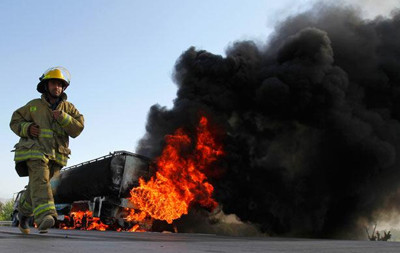By Mohammad Reza Gulkohi
There has been an upsurge of violence on the highways in the south and east of the country. Journeys that took only a few hours three years ago can be interminable. There are daily bloody skirmishes, trucks carrying NATO supplies are targeted by magnetic bombs and IEDs, and civilians travelling on work could be stuck for hours because of blockades by security forces.
There are also civilian casualties. Eight workers were killed on the highway in Logar on July 18. On June 26, five soldiers of the national army were abducted, and then killed on the highway in Ghazni province.
The most perilous stretch of roads is from Kabul to Kandahar and Kabul to Herat.
Mohammad Hashim Faizi, deputy governor of Logar, confirmed the murder of the eight men who were working in a NATO camp. "The workers were dropped from their vehicle next to a foreign forces base on the route of Pul Alam (the center of Lugar) and then they were killed," he said not giving any more details. Asked if the Taleban had a hand in the killings, he did not say no.
The five soldiers who were going home on vacation to Kapisa, Kunduz and Takhar were killed in Ab Band district of Ghazni. Nabi Jan, the spokesperson of the Ghazni governor, confirmed the killing.
Zaher is a carpenter working in a NATO military base in Shindand, Herat province. He says people like him who work for international forces are more at risk of being abducted or killed. "Some of my colleagues have lost their lives on their way from home to work. There are armed opponents on the way, and there is the constant fear of being captured or killed by them," he says.

An Afghan firefighter run next to a burning oil tanker carrying fuel supplies for NATO forces after it was allegedly attacked by Taliban on Jalalabad highway, east of Kabul. (Photo: AP)
An interpreter with the Ghazni PRT (Provincial Rehabilitation Team) who did not want to be identified said each time he was on the highway he was plagued by "fear and terror ... because I have heard about the murder of those working in foreign military bases." He does not consider what he is doing is wrong. The "goal" for people like him is only to find livelihood, he adds.
Under attack
All highway travellers have stories of burning NATO fuel trucks and exploding bombs.
Suhrab, a driver on the road between Kabul and Ghazni, a distance of only 140 kms, has seen the thick smoke and flames of torched fuel tankers many times. He says the truck drivers rarely make it to safety. "It hurts me to see the tankers on fire," he says.
On July 22, Members of Parliament (MPs) voted against the Interior Minister Mujtaba Patang on the deterioration of security on two highways - Bamiyan-Kabul and Kabul-Ghazni. Mirdad Khan Nejrabi, head of Internal Affairs and National Security Committee, said security was the responsibility of the Ministry of Interior Affairs.
The minister, who had been served several summons by Parliament but each time sent his deputies, in turn accused unidentified lawmakers of trying to show the police as inept so the responsibility of escorting the NATO tankers would be given to their security companies. President Hamid Karzai has appointed Patang "caretaker interior minister".
Losing side
Nematullah, a driver on the road between Helmand and Kandahar, believes the police are ill equipped to counter armed opponents of the government. "The police always are at the receiving end, and drivers and their tankers are burnt," he says.
Jalil, another driver, said he was witness to an attack on a convoy of 10 trucks. "The police escort was without any weapons, and when the Taleban came on the road they escaped. The drivers remained on the road and were killed by Taleban," he says.
Helmand Public Protection Chairman, Abdul Ghafar Noorzai, dismisses complaints from drivers about the police not being able to provide security on the highways. "Since the responsibility of convoys was handed over to the police no truck has been burned," he asserts.
Traders who use the highways to transport goods run the risk of huge financial losses.
Over the past six months some 250 trucks and tankers have been torched on the Kabul-Kandahar highway. Abdul Wali Wardak, a trader, said as many as 22 trucks belonging to Wardak Ltd., were burned on the Kandahar highway in Jawza (from May 22 to June 21, the third month of the solar year).
Zabih Hamidi, another trader, said 18 trucks belonging to his company were burned in Maidan Wardak on the Kabul-Kandahar highway. "Many of our drivers lost their lives on this highway," he says. He said the police who are under the Ministry of Interior Affairs were poorly equipped to provide security for trucks.
Mohammad Qurban Haqjo, chief executive officer of the Afghanistan Chamber of Commerce & Industries, says private security companies were doing a better job of providing security than the police. " Now, we have to pay 175 USD for each truck to ensure security for every 50 kms of the highway. The amount is four times more than what was paid to private companies," he claims.



